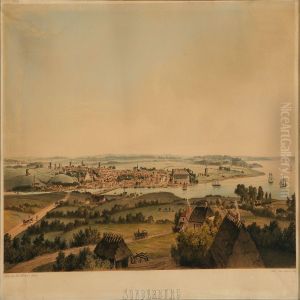Charles Fuchs Paintings
Charles Fuchs was a German painter known for his landscape and architectural works. Born on February 22, 1803, in the city of Göttingen, Germany, Fuchs developed an early interest in art, which was nurtured by his environment and the cultural atmosphere of the time. During the 19th century, Europe experienced a resurgence of interest in the arts, literature, and the natural world, which would come to influence Fuchs's artistic direction.
Fuchs studied art at the Düsseldorf Academy, one of the leading art schools in Germany at the time, where he was influenced by the teachings of Johann Wilhelm Schirmer, a prominent landscape painter of the Düsseldorf school. Fuchs's education at the academy shaped his technique and his focus on landscape painting. He became known for his detailed and atmospheric portrayals of the German countryside, often capturing the romantic and idyllic qualities of nature, which was a hallmark of the Romantic movement in art.
Throughout his career, Fuchs remained active in the German art scene, participating in exhibitions and gaining recognition for his work. He also became a member of the Düsseldorf Artists' Association, which played a crucial role in the promotion and development of art in the region. Fuchs's paintings were characterized by their fine detail, realistic portrayal of natural elements, and the use of light to create mood and atmosphere.
Charles Fuchs passed away on January 26, 1874, in Düsseldorf, leaving behind a legacy of work that continues to be appreciated for its contribution to the 19th-century German landscape painting tradition. His art captures a historical moment when the natural world was seen as a source of inspiration and reflection, resonating with the romantic sensibilities of his time.
